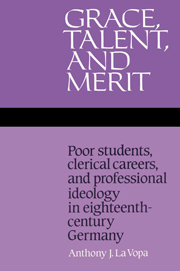 Grace, Talent, and Merit
Grace, Talent, and Merit Summary
At midcentury Johann Lorenz Mosheim, a leading theologian and advocate of ecclesiastical reform, devoted an entire chapter of his Ethical Teachings of Holy Scripture to the “dream” of creating a well-educated, dedicated clergy. The chief “obstacles” lay in the lack of natural gifts among recruits and the poverty many of them had to endure. Mosheim wanted theology students to remain at least four years at the university, until they were in their early to middle twenties, but considered thirty to be the minimum age at which they would be mature enough to assume pastoral duties. Rather than being “left to themselves” or “forced to find their bread in misery” in the interim, they should be housed, fed, and further trained in “certain well-ordered houses” supported by the state. Appointments would be distributed among the residents of these “nurseries of the church” according to their seniority and qualifications for particular offices.
At the close of the eighteenth century, every theology candidate without independent means still faced the problem the “well-ordered houses” would have removed. In the hiatus between university studies and a clerical appointment – a hiatus that usually lasted at least a year or two, and often much longer – they had to find a means of survival. Some took teaching positions in the schools, which served as “waiting rooms” for the clergy proper throughout the century. The most common alternative was to join the crowd of live-in tutors in private homes, who usually received a token cash remuneration as well as free room and board.
- Type
- Chapter
- Information
- Grace, Talent, and MeritPoor Students, Clerical Careers, and Professional Ideology in Eighteenth-Century Germany, pp. 111 - 134Publisher: Cambridge University PressPrint publication year: 1988


